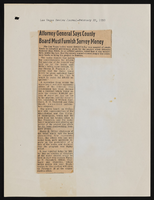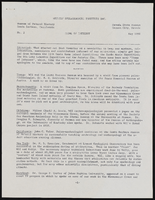Search the Special Collections and Archives Portal
Search Results

Transcript of roundtable interview with members of Temple Beth Sholom by Barbara Tabach, January 14, 2015
Date
Archival Collection
Description
In this roundtable discussion, members of Temple Beth Sholom discuss the history of the long-established congregation. Interviewees are Sandy Mallin, Oscar Goodman, Jared Shafer, Joel Goot, Arne Rosencrantz, Jerry Blut, Jackie Boiman, Gene Greenberg, and Flora Mason, with Shelley Berkley joining in later in the interview. Most of the interviewees have been involved in the leadership of the congregation. They discuss relationships with various rabbis over the years, and successful fundraising efforts to build the original synagogue. Other early leaders in the congregation were Edythe Katz-Yarchever, the Goot family, Stuart Mason, Herb Kaufman and Leo Wilner. Until the 1980s, Temple Beth Sholom was the only synagogue in Las Vegas, but after a dispute over the burial of a non-Jew, a new synagogue formed (Shareii Tefilla), and at nearly the same time, Temple Beth Sholom began investigating a move from their site on Oakey Boulevard. Most have nostalgia for the former location, but discuss the changes in the neighborhood that necessitated the move to Summerlin. Then they discuss the other initiatives that were borne out of Temple Beth Sholom, such as bond drives for Israel, B'nai B'rith, and the Kolod Center. They share other memories, then discuss the leadership and Sandy Mallin becoming the first female president of the temple. They credit Mallin with keeping the temple going through lean years, and helping to recruit Rabbi Felipe Goodman. The group goes on to mention other influential members of the Jewish community including Jack Entratter and Lloyd Katz, who helped integrate Las Vegas.
Text
Nevada Magazine correspondence: publications, 1988 to 2009
Level of Description
Archival Collection
Collection Name: Dennis McBride Personal Papers
Box/Folder: Box 25 (Restrictions apply)
Archival Component
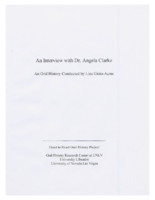
Transcript of interview with Dr. Angela Clarke by Lisa Gioia-Acres, October 3, 2008
Date
Archival Collection
Description
Interview with Dr. Angela Clarke conducted by Lisa Gioia-Acres on October 3, 2008. A native of Baltimore, Maryland, Clarke spent a great deal of time reading medical texts and started working at Social Security by the age of fourteen. Following high school, she joined the women's Air Force and attended Morgan State College on the GI Bill. Clarke recalls instances of racism and the efforts she personally made to mitigate or change circumstances for blacks. Among her many awards, she was given a plaque for integrating Air Force swimming pools. Later accepted at University of Maryland, her first year's tuition was paid by the Jessie Smith Noyes Foundation. Clarke lived and practiced medicine in Beverly Hills until 1976, when a friend suggested that she was needed in Las Vegas as a board-certified family practitioner.
Text
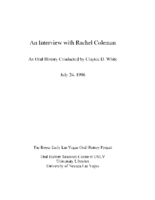
Transcript of interview with Rachel Coleman by Claytee D. White, July 24, 1996
Date
Archival Collection
Description
Interview with Rachel Coleman conducted by Claytee D. White on July 24, 1996. Born in Fayette, Mississippi, Coleman moved to Las Vegas in the 1950s and began washing dishes at the Tropicana. In 1969, having worked for a number of hotels, she was promoted to executive housekeeper at The Hacienda. She ran for president of the Culinary Workers Union Local 226 in 1987. Coleman recalls Las Vegas race and labor relations through the decades.
Text

Transcript of interview with Rev. Marion D. Bennett, Sr. by Claytee D. White, January 12, 2004
Date
Archival Collection
Description
Interview with Rev. Marion D. Bennett, Sr. conducted by Claytee D. White on January 12, 2004. Bennett grew up in Greenville, South Carolina and graduated from Morris Brown College before earning his Master of Divinity from the Interdenominational Theological Center in Atlanta. He moved to Las Vegas in 1960 to pastor Zion United Methodist Church, ultimately growing his congregation to over six hundred members. Bennett speaks candidly about the racial tension that the Las Vegas community endured during integration and his fight to establish the Equal Rights Commission in Nevada. In 1973, he ran for the Nevada State Assembly and served for ten years, focusing on quality education and employment along with healthcare and equal rights.
Text
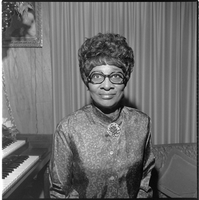
Set of photographs including baby contest, Doolittle basketball, and Mrs. Coleman
Date
Archival Collection
Description
Photographer's notations: July 71, Baby contest at St., Doolittle basketball, Gays [guys?] at CEP, Mrs. Coleman.
Image


